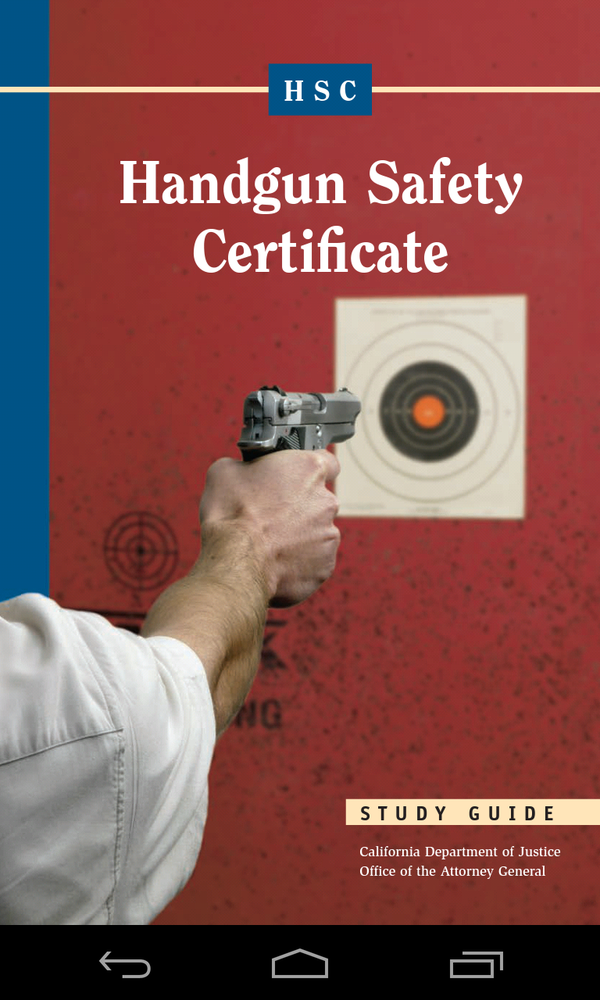California handgun safety certificate study guide summary
SVCA-1029 06/09 81564.5/61
Summary of "California handgun safety certificate study guide"
==video==
California HSC Video Guide Part 1 of 2
==six basic safety rules==
1 treat all guns as if they are loaded
2 keep the gun pointed in the safest possible direction
3 keep your finger off the trigger until your are ready to shoot
4 know your target, its surroundings and beyond
5 know how to properly operate your gun
6 store your gun safely and securely to prevent unauthorized use. Guns and ammunitionshould be stored separately
==tragedies==
major cause of accidental shootings of children
* easy access to loaded handguns in homes
* ignorance: keep education, being educated!
* carelessness:
Typical examples
* Two young children playing in their home found a loaded handgun with the magazine removed on a bedside table. One child was injured when the handgun was fired.
* A handgun owner assumed a handgun was unloaded. While cleaning it, he accidentally fired the handgun, causing injury to himself.
* While practicing target shooting, a shooter was distracted by a noise behind her. She turned with her finger on the trigger and accidentally fired, injuring a person standing nearby.
==rules for kids==
When see a gun
* stop
* don't touch
* leave the area
* tell an adult
==revolver==
parts
* barrel
* cylinder
** cylinder latch
* hammer
* ejector rod
* trigger
** trigger guard
* grip
trigger function
* single action: single function to release the hammer
* double-action: cock the hammer, and to release
load
* release the cylinder latch
* swing the cylinder out
* insert a cartridge of ammunition into each chamber
* close the cylinder
unload
* release the cylinder latch
* swing the cylinder out
* use the ejection rod to remove cartridges
==semiautomatic pistol==
parts
* slide
** slide lock
* safety
* hammer
* trigger
** trigger guard
* magazine
** magazine release
* grip
load
* push the magazine release
* remove the magazine
* insert cartridges into the magazine
* insert the magazine into the pistol
* pull the slide to the rear and release it
* move any safety to ON (ready to shot?)
unload: not just the magazine being removed, must check chamber !!
* push the magazine release
* remove the magazine
* pull the slide to the rear and lock it back
** this should eject any cartridge in the chamber
* visual check the chamber to ensure it is empty
==ammunition==
a cartridge or a round
* primer, case, propellant, bullet
May travel one to two miles!
==carry a concealed weapon==
It is illegal for any person to carry a handgun concealed upon his or her person or concealed in a vehicle without a license issued pursuant to Penal Code section 26150. (Pen. Code, § 25400.)
A firearm locked in a motor vehicle’s trunk or in a locked container carried in the vehicle other than in the utility or glove compartment
is not considered concealed within the meaning of the Penal Code section 25400;
neither is a firearm carried within a locked container directly to or from a motor vehicle for any lawful purpose. (Pen. Code, § 25610.) // negative, reversed sentence, hard to parse! reverse back!
==storage==
four measures
* store guns unloaded
* guns and ammunition are stored separately
* locking device: cable lock or trigger lock
* lock box/ gun safe:
==malfunctions==
Whenever things go unexpected: no bang, or unexpected bang, no click or unexpected click
* Stop firing
* keep the gun pointed in a safe direction
* wait ten seconds
* seek competent help
If you are at a range, the usual procedure to follow when a malfunction occurs is to
* keep your firearm pointed down range,
* keep your finger off the trigger and
* raise your non-shooting hand until a range official arrives.
==safe handling demonstration==
you must successfully perform a safe handling demonstration with the handgun being purchased or acquired.
* mechanical characteristics
* how to load
* unload
* clear a malfunction
The other "test" that is required to acquire a handgun is the Safe Handling Demonstration Affidavit. This is a practical test of safe gun handling skills, where you make sure the handgun is unloaded, then you load it with a dummy round, then safely unload it. It is amazing how many people cannot pass this test on the first try, despite the prepwork I give. The most common mistake is pointing the gun at someone during the test. I will fail someone if they can't pass this test after three tries, because if a person can't load or unload a weapon without pointing the gun at me, I don't want them to have a gun.
==additional safety points==
List
* emotional state: anger or depression
* never shoot a gun in celebration
* don't shoot at water, flat or hard surface: ricochet
* don't mix guns, alcohol and drugs
* hearing damage: ear protection
* debris and hot gas: eye protection
==gun laws==
Summary
* 18 years of age to purchase a long gun: rifle or shotgun
* 21 years of age to purchase a handgun
* private party transfers:
* family transfer of firearms: long guns vs. handgun:
** handgun: still HDC requirement, 30 days to submit Firearm Ownership Record BOF 4542A
* roster of handguns certified for sale in CA
* firearm safety device requirement
* one handgun per thirty days: exemptions include pawn returns, intra-familial transfers and private party transfers
* prohibition from carrying a loaded firearm in public
==self-defense==
permissible use of lethal force in defense of life and body
there was imminent danger of such crime being accomplished; and
# the person acted under the belief that such force was necessary to save himself or herself or another from death or a forcible and life-threatening crime. Murder, mayhem, rape and robbery are examples of forcible and life-threatening crimes.
Ceases when there is no further danger from an assailant: attacker incapable of inflicting further injuries
only use the amount of force as reasonable: no excessive force



